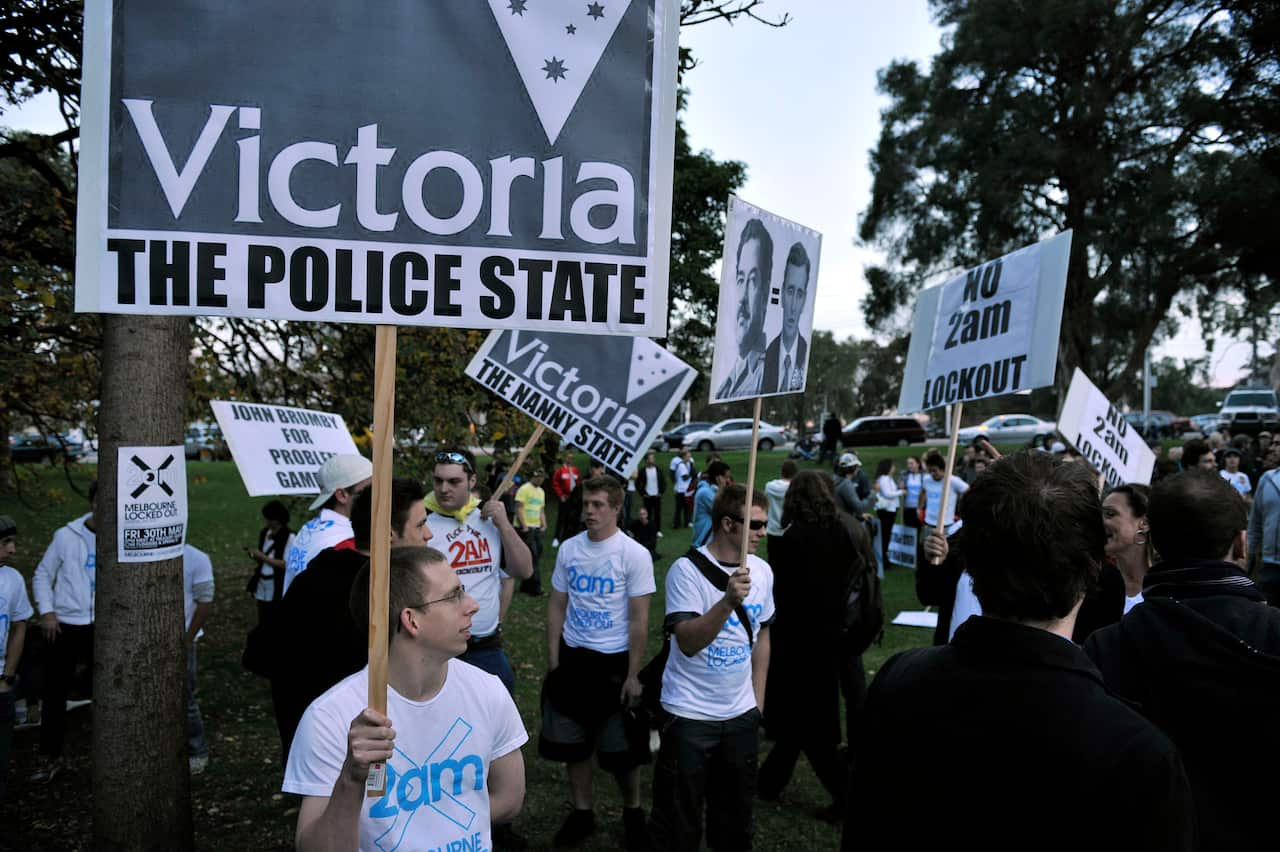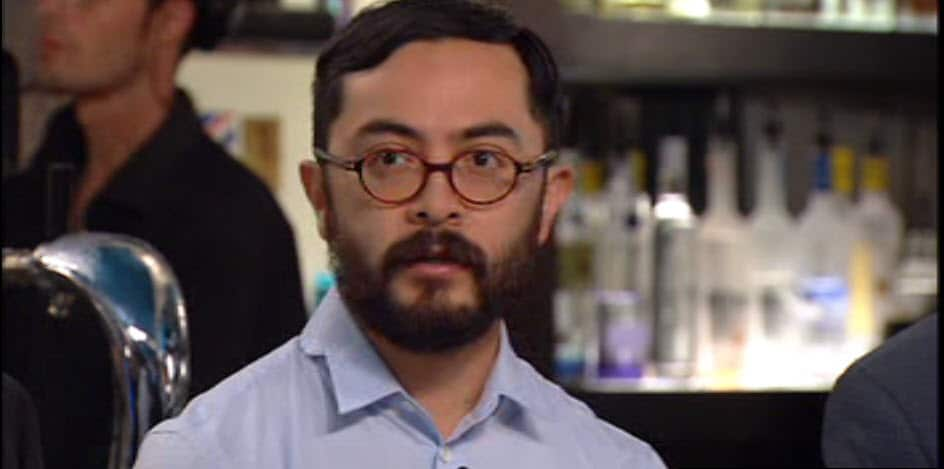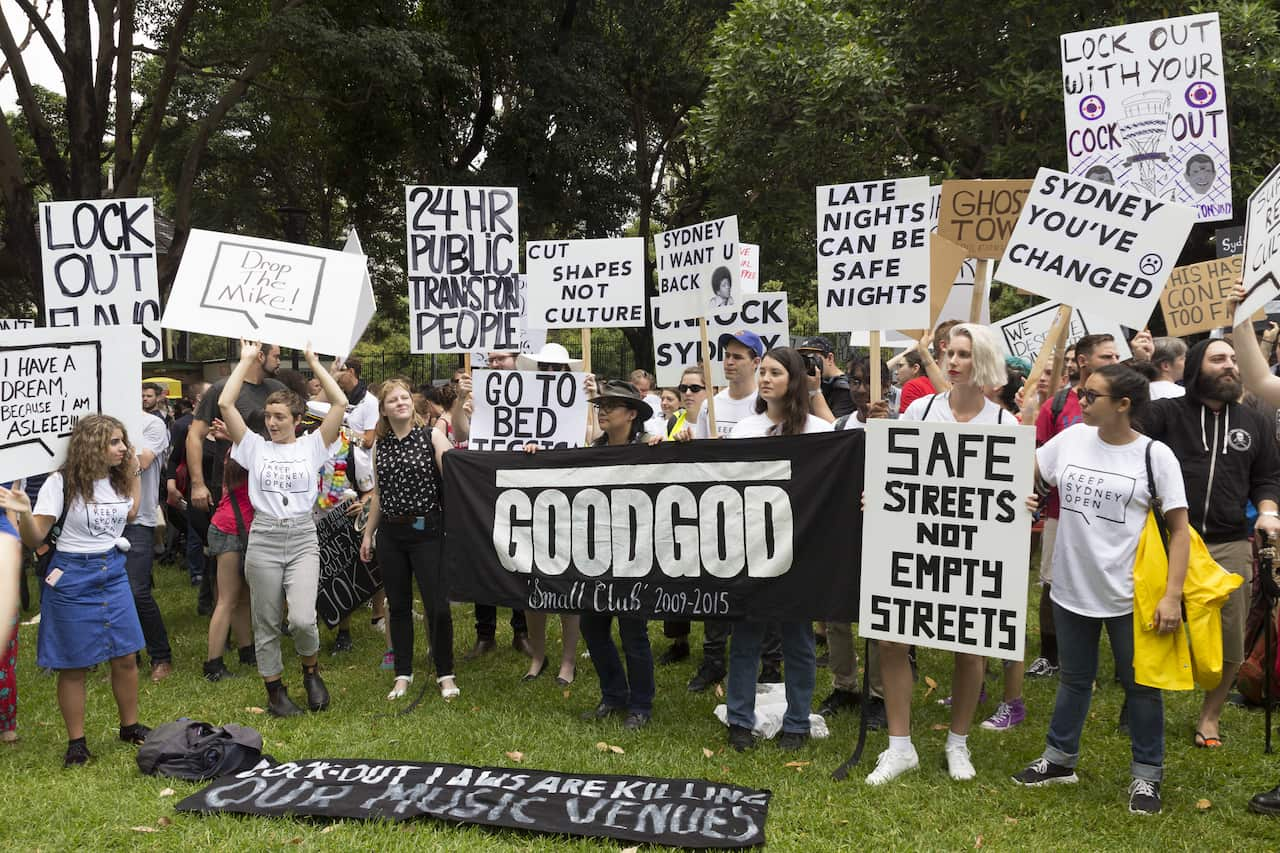The combination of 50 guests, four panelists and one Marc Fennell ‘locked’ into a Sydney club on Tuesday evening made for a political tinderbox as DJs were pitted against emergency workers, doctors against cowboy politicians and boomers against everyone for The Feed’s hour-long special on lockout laws.
The debate came as NSW’s lockout laws are up for review in Parliament, and as Queensland looks to have a state-wide lockout implemented by July. Melbourne, meanwhile, remains a 24-hour city.

Tyson Koh, who has been spearheading the Keep Sydney Open movement, immediately tackled the problem with which most pro-lockout punters have taken issue: booze and violence.
“We absolutely had to do something about it, but what we're saying is that we reacted in the wrong way. We actually had an opportunity to make our streets safer and more vibrant at the same time, but it was an opportunity that we really let go of," he said.
Mr Koh called on authorities to look at managing entertainment precincts like festivals and highlighted what he perceives as the problem with “blanket laws”.
“With the exception of casinos, they’re [the venues] all being treated in the same way, despite their safety records, [and] despite whether they’re culturally engaging.
“We know when people are culturally engaged, they drink less.”

But no-one anticipated that Mr Koh might find an ally in one-punch victim Daniel Christie’s father Michael.
In what was ostensibly a backflip from previous comments he has made on the effectiveness of the lockout laws, an exasperated Mr Christie conceded that perhaps the measures were rushed through.
“I'm not in favour of the lockout laws. I am absolutely applauding the results they've had. In that statement, it doesn't mean that they're 100 per cent perfect,” he said.
“Did we have to do something dramatically in the first place to get everyone's attention and sort of make this a ‘top of mind’, if you like, discussion? I think that has worked."
Mr Christie’s son Daniel had his life support turned off 11 days after being coward punched in Bondi attempting to help three strangers embroiled in a fight on New Years’ Eve in 2012. His death came just months after Thomas Kelly was fatally hit in Kings Cross.
What followed was a campaign demanding action against alcohol-fuelled violence in NSW, spurred on by the media and Thomas’ father Ralph Kelly, that ultimately resulted in the lockout laws, introduced just two months after Daniel passed, and without widespread consultation or trial.
As a result of his experience, Mr Christie was thrust into the media spotlight at a time when the topic of lockouts were a political hotbed. A law was enacted in his son’s name and promises were made. But this was a bittersweet outcome for Mr Christie, who says he was left on the outer by the O’Farrell government.
“How do you feel about a law being enacted in Daniel’s name?” Marc Fennell asked.
“One, I have a lot of pride over it, but secondly, I have a lot of disgust because I was told by the then premier, Barry O’Farrell, that I would be able to discuss with him, and the relevant ministers, these changes,” Mr Christie said. “Well, I’m still waiting for Barry O’Farrell to ring back.”
“The point is, I’ve had very little input ... yet I’m the one that’s labelled with this thing about Daniel’s death.”
Mr Christie fumbled for an answer when asked as to whether his son’s death had been politicised but his reply was succinct when he arrived.
“Yes. What more can you say.”

While Mr Christie expressed that it was not necessarily his desire to become a spokesperson for the issue, he concurred that lockout laws would “absolutely not” have made a difference after Senator David Leyonhjelm interjected to ask what time his son was hit - Daniel was punched at 9.20pm.
Leyonhjelm, a Liberal Democrat who has condemned the measures as a knee-jerk response to a “moral panic”, put himself in the firing line of two other panelists on the night: Dr Tony Grabs, a surgeon at St Vincents and Anthony Lynham, the architect of the soon-to-be-adopted Queensland lockout legislation and a former facial reconstructive surgeon. Leyonhjelm’s comments about emergency workers’ grievances with cases of alcohol-related violence were met with open derision from the panelists and audience members alike.
"They complain about doing their job, is essentially what it amounts to," he said.
"With [the] greatest respect, doctors are mechanics for bodies, does that make them qualified to tell us how we damage our bodies? What sort of social policy we should we apply to determine whether or not our bodies get damaged?"
While Dr Grabs reiterated that research conducted by the hospital revealed that the number of operations conducted on patients by the plastic surgery unit as a result of facial trauma in St Vincents had dropped from 145 to 58 in the two years following the lockout laws, no one was able to offer any insight as to whether the situation at nearby hospital Royal Prince Alfred, near Newtown - where incidents of violence have increased - had changed or not.
Lynham, a surgeon turned politician, proselytised his belief that a lockout was the only answer for Queensland, insisting that, despite having run trials to improve safety on the streets, a ‘last drinks’ measure was the only step that had ever resulted in a marked drop in the number of victims fronting at hospitals with serious alcohol-related injuries.
But when all was said and done, it was the Senator who had the last laugh.
“What's the difference between God and a doctor?” Leyonhjelm asked.
“God doesn’t think he’s a doctor.”
Through award winning storytelling, The Feed continues to break new ground with its compelling mix of current affairs, comedy, profiles and investigations. See Different. Know Better. Laugh Harder. Read more about The Feed
Have a story or comment? Contact Us


